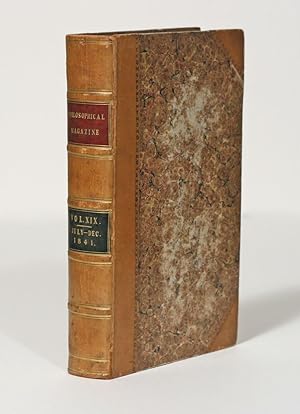Descripción
FIRST EDITION of the derivation of Joule's Law, one of the fundamental laws of electricity. Joule, "in the paper now under consideration, was the first to announce the definite law that 'when a current of voltaic electricity is propagated along a metallic conductor, the heat evolved in a given time is proportional to the resistance of the conductor multiplied by the square of the electric intensity,' i.e. electric current. In the same paper he showed that the law applies, when proper allowance is made for certain disturbances, to heat produced in electrolytes. The paper also contained the first reference to a 'standard of resistance;' this consisted of a coil of ten feet of copper wire .024 inch in thickness. "These experiments contained the germs of Joule's second great discovery, the equivalence of heat and energy, which he fully developed later. But he had already made it clear that the energy set free in the battery is also proportional to the resistance of the circuit and to the square of the current" (Dictionary of National Biography). NOTE: Joule had originally announced his experimental results in a speech before the Royal Society on December, 17,1840, but the Royal Society did not deem the paper worthy to be printed in their respected Philosophical Transactions; an abstract, instead, was printed in their Proceedings of the Royal Society. In: The London, Edinburgh, and Dublin Philosophical Magazine and Journal of Science, vol. XIX, no.124, pp.260-277. London: Richard and John E. Taylor, 1841. Octavo, contemporary three-quarter calf, marbled boards. Occasional light foxing, some rubbing to boards. A handsome copy in contemporary binding. N° de ref. del artículo 564
Contactar al vendedor
Denunciar este artículo
![]()
